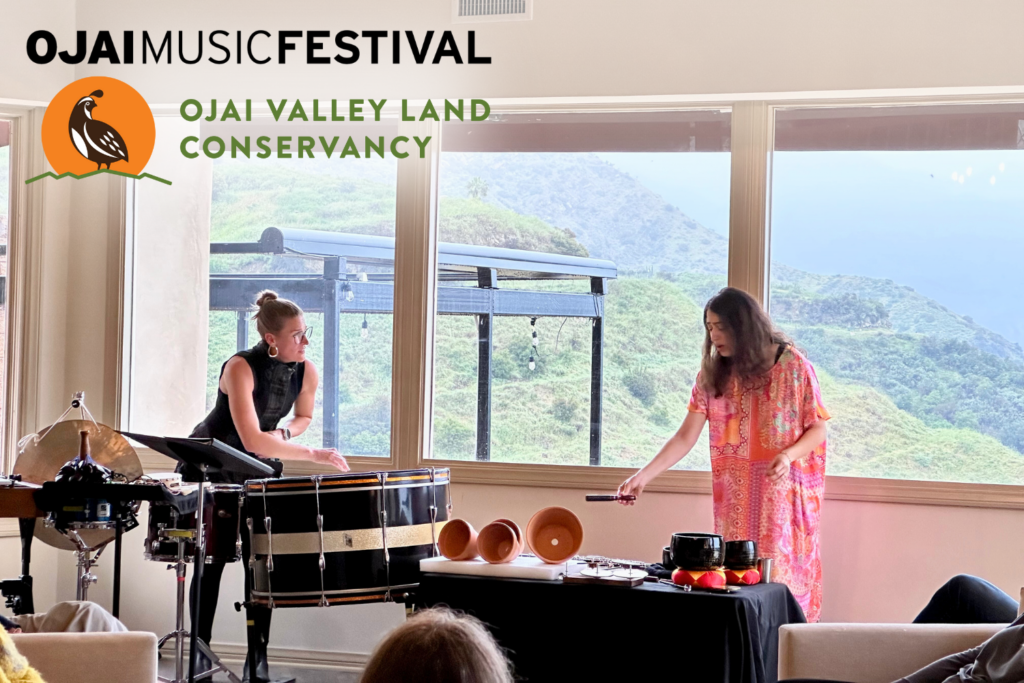Music from the 2024 Hike + Hear
Enjoy information about the music performed at the Hike + Hear, April 13, 2024, with Ojai Music Festival and Ojai Valley Land Conervancy.

Frederic Rzewski (1938-2021), To The Earth
“To the Earth” was written in 1985 at the request of the percussionist Jan Williams. Williams asked for a piece using small percussion instruments that could be easily transported. I decided to use four flower pots. Not only do they have a beautiful sound but they don’t have to be carried around at all: in every place where one plays the piece, they can be bought for a total cost of about one dollar.
The text, recited by the percussionist, is that of the pseudo-homeric hymn “To The Earth Mother of All,” probably written in the seventh century B.C. This simple poem is a prayer to Gaia—goddess of the Earth. The Earth is a myth, both ancient and modern. For us today as well, it appears increasingly as something fragile. Because of its humanly altered metabolism, it is rapidly becoming a symbol of the precarious human condition. In this piece the flower pots are intended to convey this sense of fragility.
The writing of this piece was triggered by reading an article on newly discovered properties of clay, the substance of which pots and golems are made. Among these properties are its capacity to store energy for long periods of time and its complex molecular structure. This idea for clay as something half-alive, a kind of transitional medium between organic and inorganic materials, led me to look at flower pots. I found, in fact, that some pots are “alive” while others are “dead”: some emit a disappointing “thunk” when you tap them while others seem to burst into resonant song at the slightest touch.”
XXX. TO EARTH THE MOTHER OF ALL
[1] I will sing of well-founded Earth, mother of all, eldest of all beings. She feeds all creatures that are in the world, all that go upon the goodly land, and all that are in the paths of the seas, and all that fly: all these are fed of her store. Through you, O queen, men are blessed in their children and blessed in their harvests, and to you it belongs to give means of life to mortal men and to take it away. Happy is the man whom you delight to honour! He has all things abundantly: his fruitful land is laden with corn, his pastures are covered with cattle, and his house is filled with good things. Such men rule orderly in their cities of fair women: great riches and wealth follow them: their sons exult with ever-fresh delight, and their daughters in flower-laden bands play and skip merrily over the soft flowers of the field. Thus is it with those whom you honour O holy goddess, bountiful spirit. Hail, Mother of the gods, wife of starry Heaven; freely bestow upon me for this my song substance that cheers the heart! And now I will remember you and another song also.
Homeric hymn No. 30, translated by H.G. Evelyn-White
Lou Harrison (1917-2003), Ariadne (1987)
Ariadne draws inspiration from the music of India. Harrison’s music combines Indian and Western influences. The opening movement, “Ariadne Abandoned,” functions like an alap-an introductory piece that introduces the mode and spirit of the work. In the second movement, “The Triumph of Ariadne and Dionysos,” Harrison employs a compositional principle related to the Indian tala, a complex repeating rhythmic pattern.
Lou Harrison: In Retrospect on New World Records (Leta Miller and William Winant) available on Apple Music and Spotify
